Singapore is a technologically advanced nation, right? Well, yes and no, depending on how you look at it. In fact, some may even call us “backward”.
During the National Day Rally on Sunday night, Prime Minister Lee Hsien Loong told the story of how Manpower Minister Lim Swee Say had a “suaku” (country bumpkin in Hokkien) moment at a street stall in Shanghai. Mr Lim was queuing to buy chestnuts when he saw other customers waving their phones when making their purchase. Thinking they were doing so to get a special discount, he told the stall holder that he would be paying the full price. Soon after that, he realised that the customers were actually scanning the stall’s QR code with their phones to make payment through an e-payment system.
In recent years, China has become a huge adopter of e-payment systems. Even roadside stalls and landlords accept payments done through mobile apps such as Alipay and WeChat. “In major Chinese cities, cash has become obsolete. Even credit and debit cards are becoming rare,” PM Lee said in his speech.
read more
Can Singapore catch up in race to go cashless?
In high-tech Singapore, where cashless payment options abound, consumers prefer to fish for physical notes & jiggle coins to pay for goods & services.
Last year, 6 out of 10 consumer transactions were made in cash here - a huge spanner in the works for Singapore's Smart Nation drive.
In his National Day Rally speech on Sunday, Prime Minister Lee Hsien Loong contrasted Singaporeans' highly connected lifestyle & digital literacy with their unwillingness to go digital when it comes to payment. As such, Singapore lags behind other cities on this front.
read more
E-payments: 'S'pore can still catch up'
When Minister Josephine Teo visited China in 1983, the country had a separate currency system for foreigners. They had to use Foreign Exchange Certificates instead of the yuan for purchases.
This was stopped in 1995.
But today, the yuan is rarely seen in big cities like Shanghai, with many choosing to pay for products & services with their smartphones instead of cold, hard cash.
read more
When Lim Swee Say felt 'suaku' in smart city Shanghai
When Manpower Minister Lim Swee Say was queueing up to buy chestnuts at a roadside hawker stall in Shanghai a few years ago, he saw all the people ahead of him wave their handphones, take their chestnuts and leave without paying any cash.
He thought it was a special offer that required them to show their phone, and declined to participate, offering to pay the full price for his order in cash.
But it turned out the people were using WeChat Pay to scan the hawker's QR code, and Mr Lim felt "suaku", or like a country bumpkin, said Prime Minister Lee Hsien Loong on Sunday (Aug 20).
read more
Accelerating drive towards cashless economy in Singapore – A snapshot of recent initiatives
In this year’s National Day Rally Speech in Singapore, one of the key themes of Prime Minister Lee Hsien Loong’s speech was the ongoing Smart Nation initiative. Within Smart Nation, achieving a cashless economy is one of the current focus areas.
PM Lee spoke about how China has gone the furthest with e-payments, so much so that even roadside hawkers are accepting mobile payments.
He said, “Indeed, in major Chinese cities, cash has become obsolete. Even debit and credit cards are becoming rare. Everyone is using WeChat Pay or AliPay and these apps are linked to your bank account. To pay someone money, just pick up the phone, scan his QR Code. And you can use these apps for nearly all payments.”
read more
Prime Minister Lee wants a payment system for Singapore. Razer boss: 'Hold my mouse.'
When the country calls, you step up. That's what Razer CEO Min-Liang Tan must have thought when Singapore's PM Lee Hsien Loong posted on Twitter about the need for a unified payments system for Singapore.
The prime minister was commenting on points he made during Singapore's National Day Rally, which included the importance of modernizing the city state's payments infrastructure. The prevalence of cashless transactions in China through QR codes was highlighted as an example.
Tan's reply to the prime minister? "I'll have it out in 18 months."
read more
3 key issues at National Day Rally 2017: The push to go digital
A customer using the unified self-checkout system at Cheers' first unmanned, cashless outlet at Nanyang Polytechnic. ST PHOTO: ARIFFIN JAMAR
Even when using smartphone apps for goods and services, Ms Kelly Kin, 29, prefers to part with cash.
"I feel safer using cash," says the account manager, who was once wrongfully charged on her credit card by a ride-hailing app.
She went through hoops to report the incident, but only got a promotion code offer instead of a refund.
read more
Singapore is making cashless payments a key to its Smart Nation and this is a mistake

Yesterday, I wanted to start the week off well, so I splurged a bit and took a taxi to the office. I booked my Grab, hopped-in the ride and checked emails for the duration of the trip. At the office, the driver confirmed that I was indeed using GrabPay and let me off. It was pretty baller.
Today, I wanted to eat slightly healthy for cheap and went to the local hawker center downstairs and ordered Kimchi soup. I pulled five dollars out of my pocket, thanked the nice lady who makes the food and went upstairs to eat with my colleagues. It was also pretty baller.
This little anecdote is meant to highlight that in the day-to-day, the lifestyle difference between a cashless vs. cash-only society is fairly minimal — and yet, if we take Prime Minister Lee Hsien Loong’s National Day Rally Speech at face value, Singapore is about to make a major push to become a cashless society.
read more
Singapore lags behind other cities in several areas: PM
When visitors from China find that they have to use cash here, they ask: "How can Singapore be so backward?"
Singapore has a natural advantage as it is compact and highly connected, its people are digitally literate, & schools are teaching students basic computing and robotics.
But while Singapore has the “right ingredients”, it lags behind other cities in several areas, says PM Lee, citing electronic payments as one such example.
read more
Chinese payment provider Alipay sets sight on Singapore market
China-based mobile payment provider Alipay has its eyes on Singapore and plans to offer its platform to consumers in the city-state.
It initially eyes expanding its operations in Singapore by targeting tourists from China and Chinese citizens living on the island as well as others subscribed to a China banking account.
Currently, customers of Alibaba's financial arm are required to have a China bank-issued credit card or a China banking account for debiting transactions.
read more
Chinatown retailers to embrace cashless payments with the help of Alipay
Alipay has partnered with local digital payment provider CC PAY to offer cashless payment services to Chinatown retailers. According to multiple media reports, Alipay and CC PAY have signed up approximately 300 merchants in Chinatown to the payment app, which targets Chinese nationals living in Singapore and Chinese tourists.
Jed Huang, founder and director of CC Financial Services, owner of CC PAY, said during a press conference that the use of Alipay will help “revitalise” shopping centres such as People’s Park Complex, People’s Park Centre and Chinatown, as well as attract more locals and tourists to shop there. He added that Alipay provides a form of convenience for Chinese tourists to carry out their shopping, dining and other activities in Singapore, while enabling merchants to facilitate fast, safe and cashless payments.
The news comes days after Prime Minister Lee Hsien Loong’s recent National Day Rally speech, where he highlighted the importance of simplifying and integrating the electronic payments systems in Singapore, which is one area that the country is still lagging behind compared to China. Moreover, according to Singapore Tourism Board’s (STB) Q1 2017 Tourism Sector Performance report, China topped the list of tourism spending in Singapore, generating SG$1,075 million. Chinese tourists also topped the list of international visitor-generating markets, increasing by 14% to 851,000 in 2017.
read more
AliPay to launch local wallet for Singapore
Alipay — the mobile payment company owned by Chinese e-commerce giant Alibaba — is looking to launch a local e-wallet for Singapore consumers, it said on Tuesday (Aug 22).
The announcement came as it expanded its payment service app here targeting local merchants and Chinese nationals living in the Republic.
It follows tie-ups with taxi operators Prime Taxis, in March, and ComfortDelGro, last month, offering Alipay to passengers.
read more
Singapore government seeking e-payment solutions for micro-payments at hawker centres and coffee shops
The National Environment Agency (NEA), Housing & Development Board (HDB), Monetary Authority of Singapore (MAS) and Smart Nation and Digital Government Office (SNDGO) have jointly issued a Request for Information (RFI) for electronic payment (e-payment) solutions to support micro-payments mainly at small food shops and others. This includes hawker centres, HDB coffee shops (HDB refers to public housing developments and coffee shops in Singapore are an aggregate of small stalls or shops, often reminiscent of food courts), and shops in the heartlands.
In May, Today newspaper reported that the MAS and other agencies are working on to achieve a government aim for half the food and beverage (F&B) establishments to adopt digital services by 2020.
This is in line with the national drive towards an electronic payments society in Singapore, as part of the Smart Nation vision (for a snapshot of recent initiatives in the area, click here). E-payments is one of the five national strategic projects which the government will focus on in the immediate future.
read more
Massive inconvenience caused to elderly by station cash counters’ closure

Many elderly Singaporeans were severely inconvenienced by the closure of cash counters in 11 train station on the first day of the cashless “Smart Nation” implementation today (Sep 1). Elderly Singaporeans who do not understand English were stuck at the ticketing machines and required station staffs to assist in topping up their EZ Link card with cash.
The massive inconvenience was caused by the Land Transport Authority’s decision to remove cash transaction to appease Prime Minister Lee Hsien Loong’s call for a cashless “Smart Nation”, which he claimed a country can become “smart” only when it goes cashless.
Elderly Singaporeans are likely to be inconvenienced further, along with children or anyone without a bank card, when all the ticketing machines stop taking cash in 2020. Hawker centres and retail shops were also be mandated to have a card payment option, and they were told to absorb the “affordable” transaction fees.
related: Land Transport Authority: No cash transaction in “Smart Nation”
read more
In Urban China, Cash Is Rapidly Becoming Obsolete

A Shanghai clothing market that allows customers to pay using the apps Alipay and WeChat

A customer scanning a QR code to pay for breakfast using WeChat, a messenger app that has become essential for everyday life

A QR code is scanned to pay for a taxi ride using Alipay

Customers line up at a Shanghai food vendor that supports WeChat and Alipay

A street key maker who accepts mobile payments. For many small businesses, the technology has helped keep costs down by using a QR code instead of an expensive card reader

The IAPM mall in central Shanghai. Mobile payments reached $5.5 trillion in China last year

Visitors at the Bund in Shanghai. While mobile pay is useful for local residents, it may pose challenges for tourists and foreign businesses
There is an audacious economic phenomenon happening in China. It has nothing to do with debt, infrastructure spending or the other major economic topics du jour. It has to do with cash — specifically, how China is systematically and rapidly doing away with paper money and coins.
Almost everyone in major Chinese cities is using a smartphone to pay for just about everything. At restaurants, a waiter will ask if you want to use WeChat or Alipay — the two smartphone payment options — before bringing up cash as a third, remote possibility.
Just as startling is how quickly the transition has happened. Only three years ago there would be no question at all, because everyone was still using cash.
read more
The rise of China's cashless society: Mobile payment trends in 2017
After Alibaba declared the first week of August “Cashless Week” and WeChat answered by naming August 8th “Cashless Day” and this entire month “Cashless Month,” a new research was published to illustrate how mobile payments are becoming a part of Chinese people’s everyday life.
The Tencent Research Institute along with Ipsos research group and the Chongyang Institute for Financial Studies at Renmin University of China (RDCY) have analyzed the penetration and trends of cashless payments in China. The research titled “2017 Mobile Payment Usage in China” published by China Tech Insights is based on WeChat Pay data and an online survey of 6,595 respondents.
Here are some of their key insights:
- Mobile payments have skyrocketed in 2016
- Young people (especially women) are leading the cashless trend
- Chinese have almost no money in their wallet—and they don’t care
- Geographical differences are small, but the rural-urban divide is still an obstacle
- Mobile payments have conquered the service industries
- Social credit systems are here to stay
read more
Beijing named China's 'smartest' city for leading the cashless revolution
Beijing has been dubbed China's "smartest" city by a new survey based on Beijingers willingness to no longer carry around burdensome banknotes.
Recently a number of stories have been published in both Chinese and foreign media highlighting how China is quickly becoming a "cashless society" as the use of mobile payment apps, like Alipay and WeChat, become more and more widespread. Indeed, we can't remember the last time we were forced to use a bill with Mao's face on it.
Chinese tech giant Tencent, along with the Chongyang Institute for Financial Studies at Renmin University and French market research firm Ipsos, tried to measure this new phenomenon recently by asking residents of 324 different Chinese cities about how comfortable they were with using mobile payment systems.
read more
This City Was Just Named the 'Smartest' in China
A report on the cashless society ranks Beijing as the "smartest" city in China. The report was a combined effort by tech firm Tencent, the Chongyang Institute for Financial Studies at Renmin University and the French market research firm Ipsos, Xinhua reports.
The report identified the "smartest" cities by measuring several different characteristics, including transport, education, shopping and food delivery. It surveyed 324 Chinese cities and over 6,500 residents on their use of mobile payment systems. Payments for a range of different goods and services, including takeaway food, restaurant dining, telecommunications and transport were included in the study.
Overall, Beijing topped the list as the most “cashless” city. The capital was followed by Shenzhen, Guangzhou and Shanghai.
read more
Mobile payment is rendering our wallets obsolete
Today is Cashless Day, a designation initiated by WeChat Pay two years ago to recognize the dawning era of digital payments. Last year in China, 157 trillion yuan (US$23.3 trillion) of payments were made on mobile devices — more than 200 times the volume in the United States. That figure is expected to continue expanding by nearly 70 percent a year as mobile finance spreads to more sectors of the economy.
SEBASTIAN Martin, an expat from the US, opened his cafe called Cambio on Haifang Road at the end of 2014, but the coffee shop didn’t really feel the takeoff of mobile payments until last year. About half of the café’s 500,000 monthly transactions are now down without any cash changing hands.
“It helps me raise operational efficiency, and the digital bills provide an easier log of what sells best,” he told Shanghai Daily.
read more
Beijing's metro debuts mobile payment
Passengers can simply swipe their phones to board all of Beijing's subway lines starting Monday, local authorities said.
According to Beijing Subway, riders with compatible phone models may download an app to take the subway and recharge their e-tickets online. "Mobile payment can save time for passengers," said a spokesperson from the Beijing Subway.
About a month ago, Beijing Subway, along with the Beijing Municipal Transportation Company, piloted mobile payment on the Fangshan metro line, drawing around 200,000 new card users.
read more
Alibaba and Tencent’s fight over Chinese cashless spenders escalates
As the concept of “going cashless” heats up in Chinese society, the country’s two leading mobile payment giants, WeChat Pay and Alipay, have pushed out marketing campaigns to further promote their respective payment apps to be the top destination for Chinese consumers looking to settle their cashless deals.
On July 31, Alipay (under Alibaba Group) announced that it was naming the week beginning August 1 “Cashless Week”; on the same day, WeChat Pay (under Tencent Holdings) picked one day—August 8—and declared it “Cashless Day,” and also nicknamed the entire month “Cashless Month.” During the campaign period, both apps provide consumers with a massive amount of “real money” incentives (offered by Alibaba, Tencent and merchants who work with them) in order to reward them for going cashless shopping and, most importantly, for settling deals with their apps.
Alipay users who spend at least 2 yuan per deal between August 1 and 3 have the chance to be rewarded with 0.88 to 4,888 yuan (roughly $0.13 to $728). These rewards are accumulative and can be used in the future. In addition, if people use the app to pay more than once each day during the campaign period, they can enter the lottery to receive a random portion of 18,888 grams of gold.
read more
China Goes Cashless With Consumers Spending $5.5 Trillion Via Mobile Payments, 50 Times More Than Americans

Chinese consumers spent US$5.5 trillion via mobile payment platforms last year, about 50 times more than their American counterparts. By the end of 2016, Tencent alone saw both its active mobile payment accounts and average daily payment transactions exceed 600 million, according to a new report released by Tencent Research Institute, The Chongyang Institute for Financial Studies at Renmin University of China, and research firm Ipsos.
Based on a sample data set from WeChat Pay in 324 Chinese cities along with an online survey of 6,595 respondents, the survey found that the cashless lifestyle is quickly becoming a reality in China.
Specifically, 52% of Chinese use cash for 20% or less of their monthly consumption. Around 74% of people stated that they could live for more than a month with only RMB100 (US$15) in cash, and 84% said that they could accept a totally cashless lifestyle.
read more
Analysts: China could become the first cashless society
Jack Ma, founder and chairman of Alibaba Group, together with Swedish PM Stefan Löfven, China, June 2017
The Nordic countries are at the cutting edge in the looming transition to cashless societies. In Sweden, less than 2 percent of all transactions are in cash; and Denmark is no less of a poster case in this regard. Mobile solutions like Swish, Mobilepay and iZettle are making cash increasingly redundant even in physical retail.
But according to a number of analysts, China could become the first country to reach full cashless status with the help of exploding popularity of mobile solutions, reports Xinhua News, referring to an analysis from July 24th. In the past decade, China has leapfrogged development through solutions like AliPay and WeChat, which are even more sophisticated and versatile than their Nordic and American counterparts.
More and more Chinese consumers are getting used to paying for their daily expenses with smartphones instead of cash. Moreover, a booming e-commerce sector has laid the foundation for digital payment platforms in the Middle Kingdom. The country's sophisticated online payments infrastructure, say the analysts, could make China the first country in the world that dumps cash for good.
read more
Beijing Has Become China's Leading Cashless Society
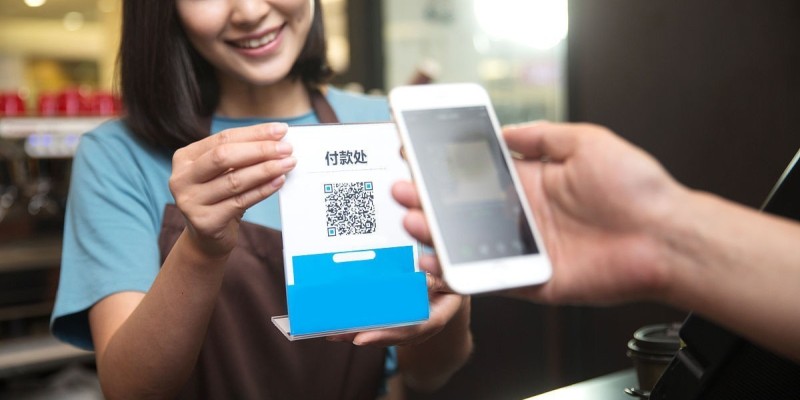
The breakneck pace of the adoption of online payment systems has led to the capital of China and its 21 million residents becoming its leading cashless society.
Beijing has been named the country's "smartest" city when it comes to making transactions through online payment systems, leading a list of first-tier cities that include Shenzhen, Guangzhou, and Shanghai.
The report was jointly made by the Chongyang Institute for Financial Studies at Renmin University of China, French market research firm Ipsos, and Chinese tech giant Tencent, whose massively popular WeChat social media platform now features online payment.
read more
As China Tries to Go Cashless, Government Casts a Wary Eye
China is often mentioned as having the potential to become the world’s first cashless society thanks to the near omnipresence of QR codes among brick-and-mortar retailers, enabling consumers to use smartphones and digital payment platforms like Alipay to complete transactions.
More than a few anecdotes have floated out of China about residents who have gone for days, if not weeks, without cash by using smartphones for all purposes, often without even leaving messaging platform WeChat.
But is the complete elimination of cash in the Middle Kingdom something that could actually happen, or more of a pipe dream being pushed by the country’s digerati?
read more
In China, A Cashless Trend Is Taking Hold With Mobile Payments
People in China have been paying cash for things for thousands of years, long before other civilizations. Now, increasingly, they're paying with their cellphones.
So while the Trump administration hailed a bilateral deal in May, that would allow U.S. credit card firms including Visa and Mastercard access to the China market, it may not be the coup those firms hoped. Chinese consumers are essentially leapfrogging plastic, and going straight from cash to mobile payments.
Chinese spent $5.5 trillion through mobile payment platforms last year, about 50 times the amount in the U.S., according to reports.
read more
China Is on Track to Fully Phase Out Cash
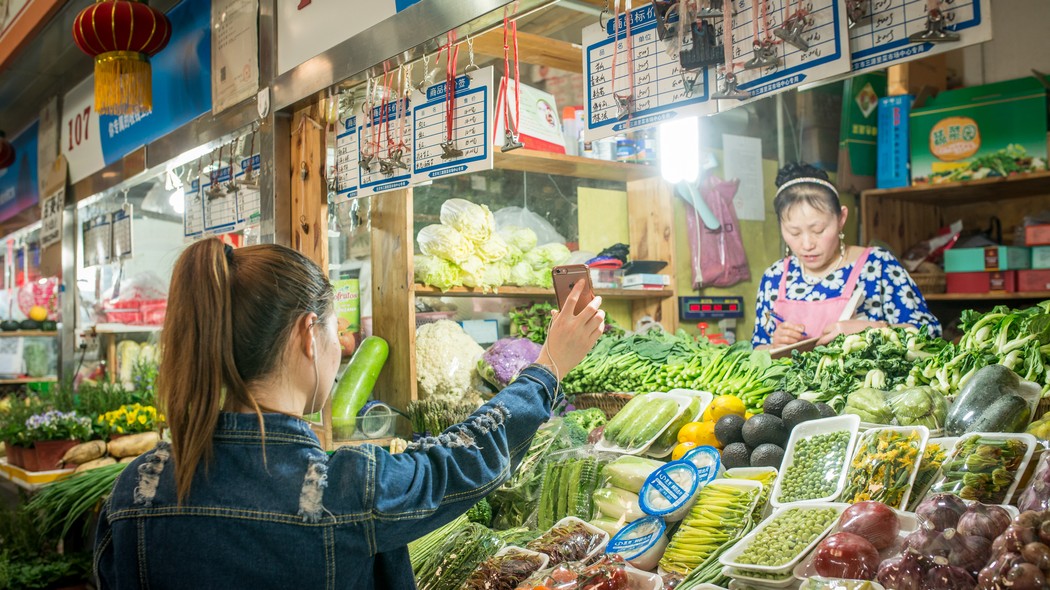
In a poky sex toy shop in Sanlitun shopping district in central Beijing, a placard with a QR code is strategically placed next to a pink, vein-knobbled dildo called the Super Emperor, and a clitoral pump. Just scan your phone, and walk out with your purchase.
The cigarette vendor across the street accepts smartphone payments too. A fast-moving queue of customers purchase smokes by scanning their phones over a tatty cardboard QR code.
All the bars in Sanlitun, equal parts seedy and swish, still take cash, but have likewise implemented cashless pay, largely through the ubiquitous WeChat and Alipay app, as primary payment platforms. Beijing taxi drivers accept smartphone payments too.
read more
China going cashless thanks to fintech boom
Street food 3.0: Noodle stand using QR-code for m-payments
A customer uses the mobile payment at a noodle stand in Shenzhen
Standing in line at a Starbucks in downtown Shenzhen, I suddenly realize that no one in front of me is paying with cash. They aren’t paying by credit card either. In fact, I can’t see a single customer holding a wallet or a purse. Instead, they just hold their mobile phones over a reader and – beep! – the latte is theirs.
“Almost no one uses cash here anymore,” says cafe manager Lily Li, adding that more than 80% of all payments in the coffee shop are made via mobile phones.
But it’s not just global chains that offer “m-payment” in one of China’s most technologically advanced cities. Out on the street, two women are selling noodles from a small stall during the morning rush. Amid the steam billowing from the big boiler and the smell of hot spices, I can hear the constant beeping of phones scanning the stall’s QR code.
read more
WeChat sees bigger spenders as China goes cashless
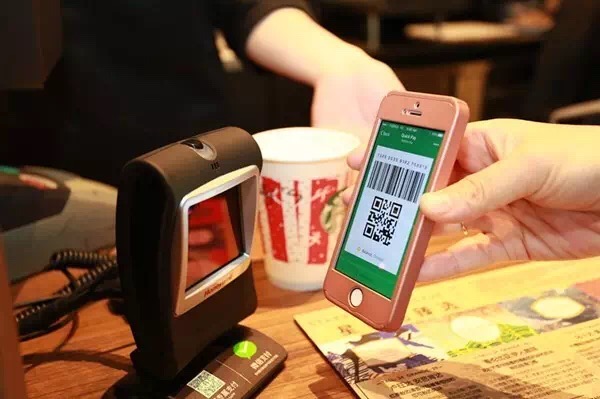
Paying for Starbucks using WeChat in China. Photo credit: Tencent
China’s smartphone owners are way ahead of everyone else on the planet when it comes to paying for things with their phones.
How pervasive is that in every day life? Well, 45 percent of WeChat users pay for things in stores using the messaging app’s wallet feature because they don’t even carry cash. That’s according to a new survey out today from Penguin Intelligence. Not bothering to carry cash is the third reason cited for using WeChat to pay for their Starbucks or the groceries – the speed and ease being the top two factors.
The messaging app’s 900 million monthly active users are spending more than ever using their phones, with larger transactions – of US$73 and above – now much more common than in 2015:
read more
Alibaba and Tencent kick off cashless payment promotions
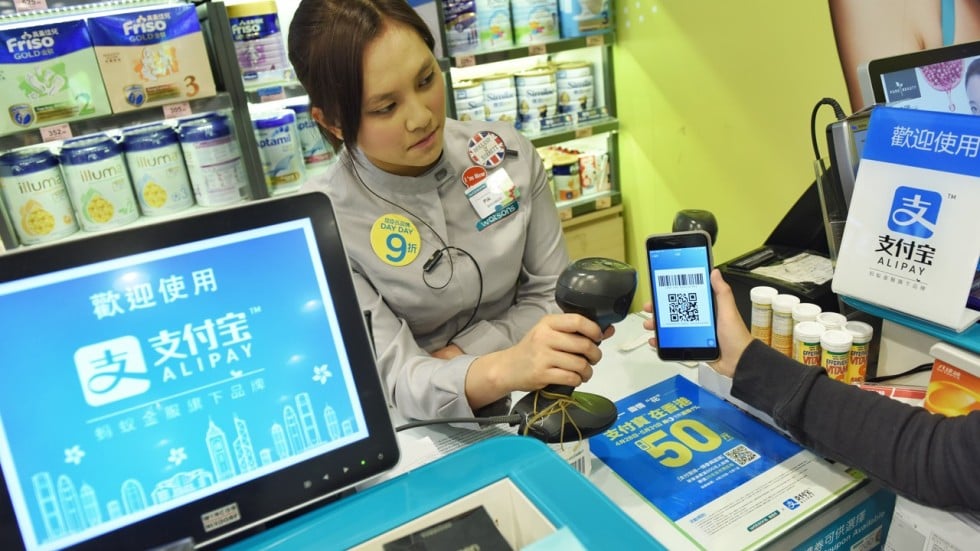
Alipay, the world’s largest mobile payment platform affiliated with Alibaba Group, owner of the South China Morning Post, is offering cash rebates of up to 4,888 yuan for the use of its mobile app to make payments between August 1 and 8, as well as the chance to own a share in 18.888 kg of gold with other users.
For the first three days of the promotion, residents in Hangzhou and Wuhan, the first two Chinese cities identified by Alipay as models for the cashless society notion, will also be able to take buses free of charge up to 12 times by scanning the app. Those who use it to pay for their bus rides for the whole week of the promotion will be eligible for lucky draws for red packages containing cash worth between 8.8 yuan and 888 yuan.
Meanwhile, rival Tencent’s WeChat Pay is offering its own cashless promotions during the same period.
read more
Chinese consumers lead the world in paying with their phones
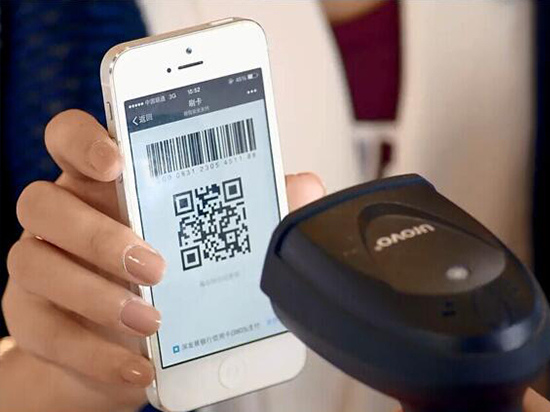
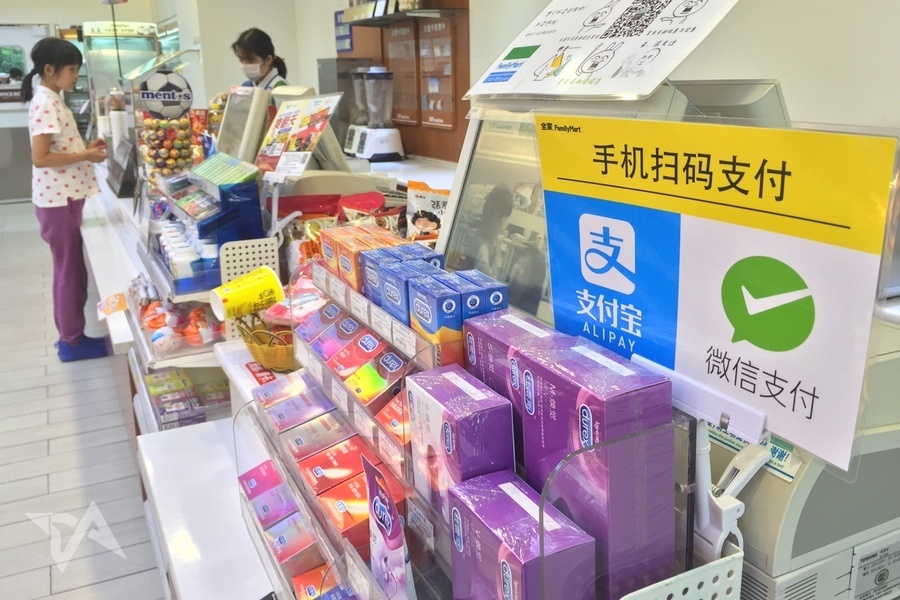
China’s smartphone owners are way ahead of everyone else on the planet when it comes to in-store payments.
China is set to have 195 million people using their phones as a wallet by the end of 2016, according to data released today by eMarketer. That represents 38 percent of all smartphones users in the country – which is double the rate in the US.
Popular messaging app WeChat, which is used by pretty much everyone in China, has a mobile wallet feature that covers both online and in-store payments. WeChat and arch-rival app Alipay are now such a common way to pay for things that most stores have signs like this (the green speech bubble one is for WeChat)
read more
Many experts predict that China will be effectively cashless within five to 12 years
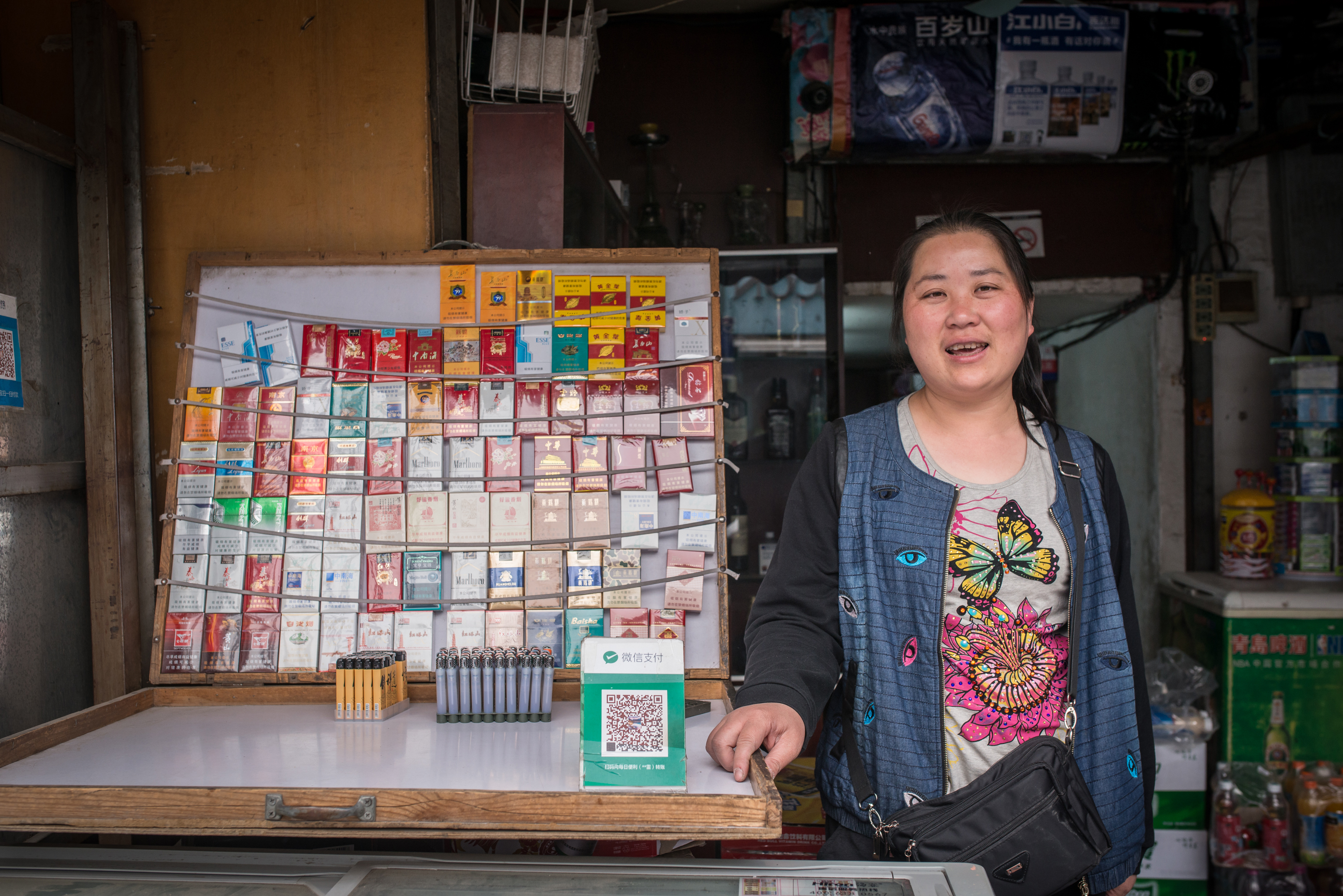
If you want a packet of cigarettes in Beijing in 2030, make sure your phone is working. Photo: Aurelien Foucault
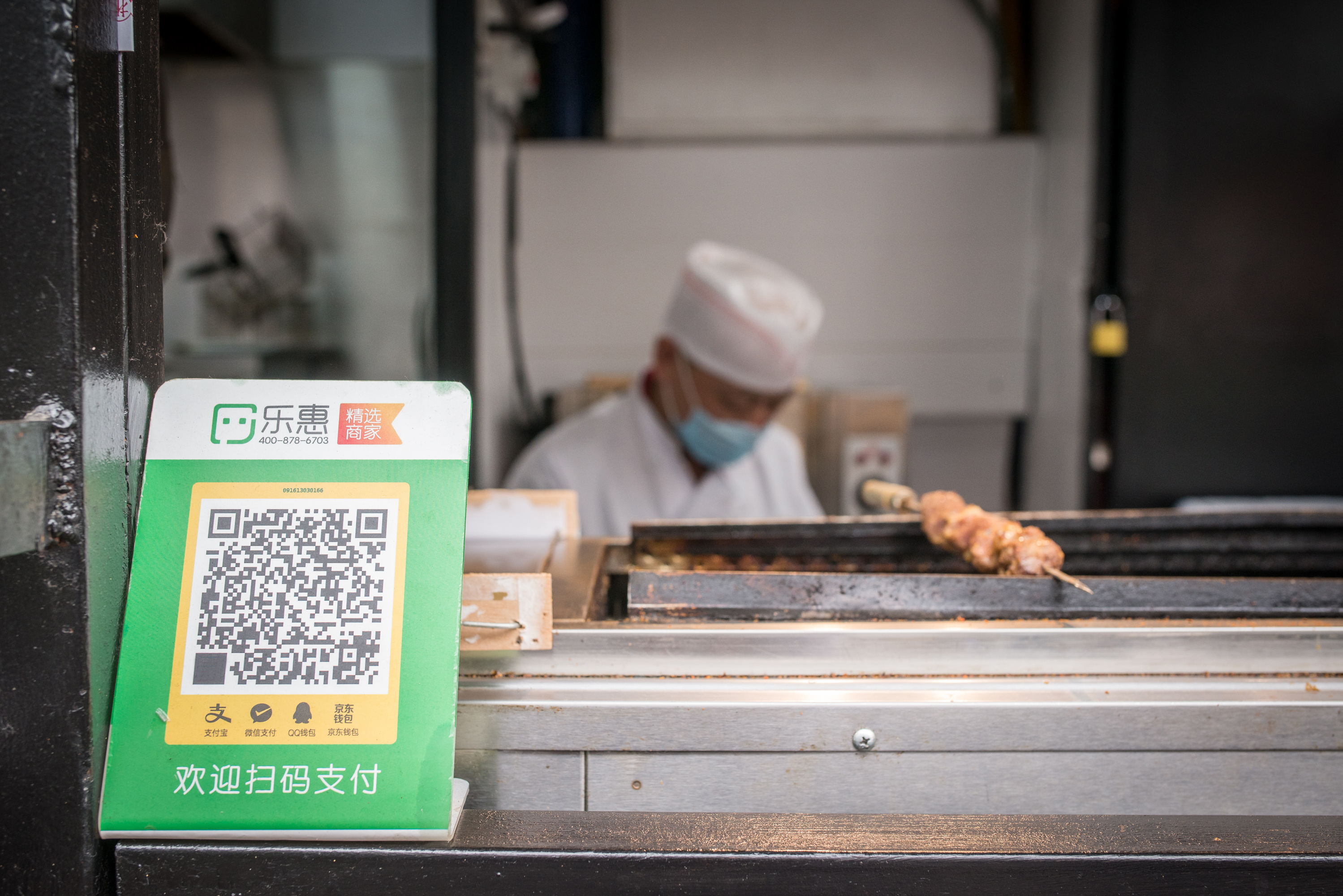
Increasing amounts of people in Beijing don't feel the need to carry cash anymore, meaning even road-side food stalls need to accept payment through QR code smartphone scans to survive.
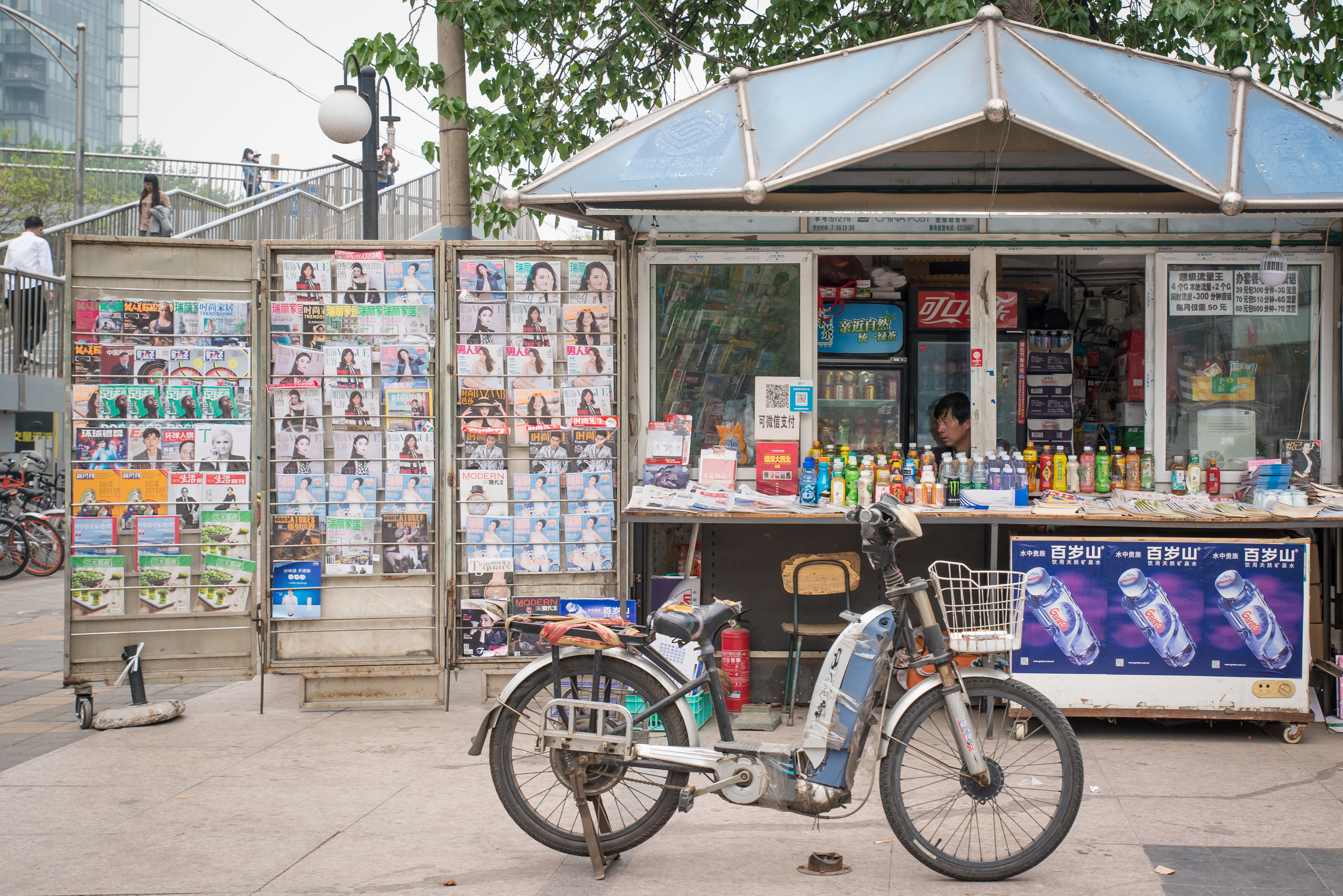
Most cashless smartphone payments in China are for small items and services such as meals, drinks and magazines. But average payment amounts are increasing as more people buy larger items and pay rent via their phones.
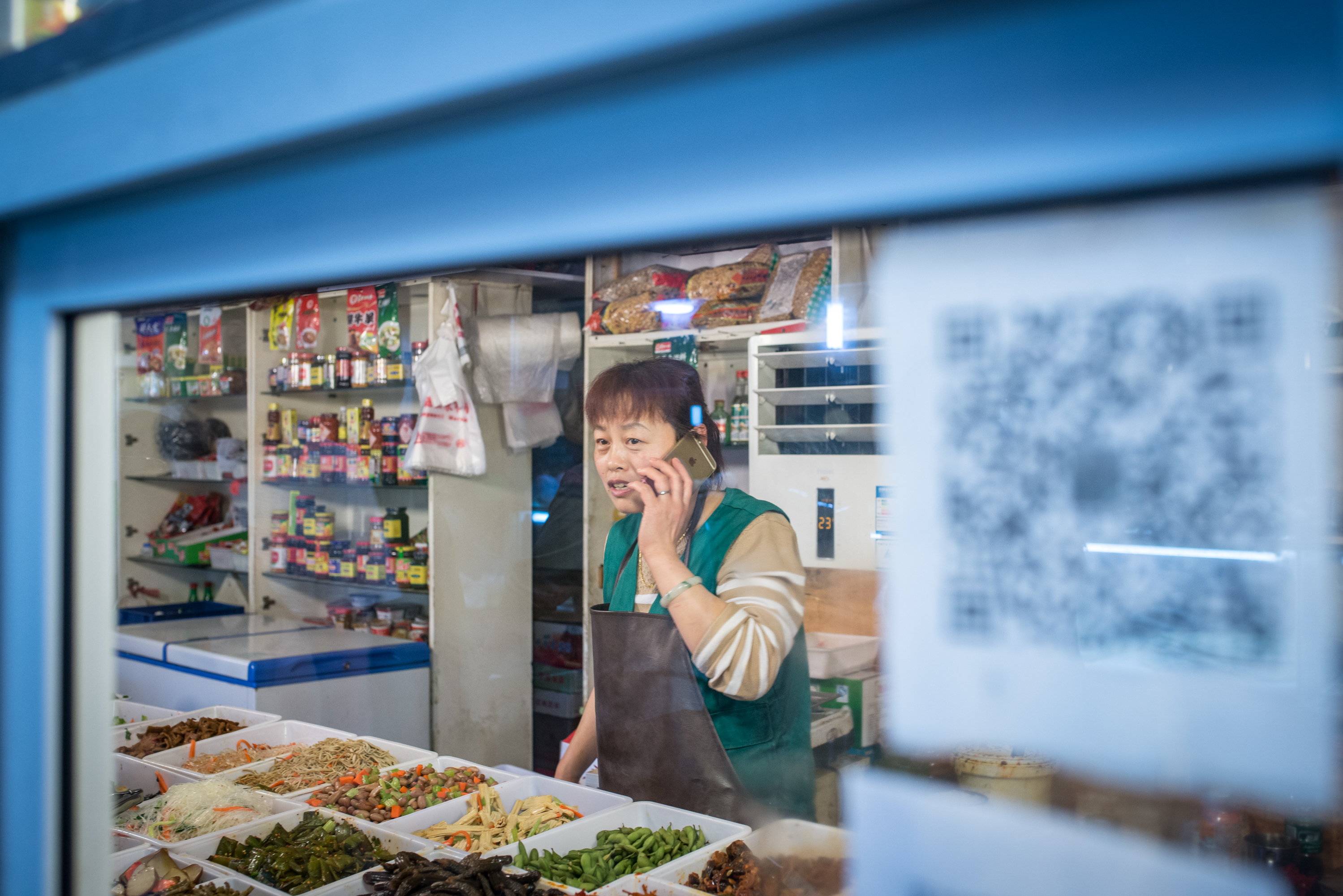
It is almost impossible to find a retail vendor in Beijing that doesn't accept cashless payments through smartphones now. Outside the capital, beggars have been spotted with QR codes hanging around their necks to accept digital donations
Of China's 1.35 billion population, 710 million are internet users. The results of a survey by the Beijing Youth Daily newspaper released in March found that, like Xu, 70 percent of internet users polled thought carrying cash was not necessary.
The apps fuelling this cashless trend are Tencent's WeChat and Alibaba's Alipay. Launched in 2011, WeChat is a multi-function app based around a messaging system that incorporates WhatsApp and Twitter-like elements. The app is phenomenally popular in China—the majority of WeChat's roughly 889 million monthly-active users worldwide are based in the People's Republic. Chinese users of apps like WeChat tend to not be put off by the personal data storing and sharing that goes on in them. Snooping by authorities is pretty much accepted.
In August 2013 WeChat's payment function was introduced; in-store payments were launched in September 2014. WeChat Pay lets users link their WeChat accounts with their bank accounts; they can spend money through the app in physical and online retail stores—usually scanning in-store QR codes at IRL stores—as well as transfer funds to and from other users. "I'll WeChat you my share" is perhaps the most commonly-uttered phrase in Beijing restaurants these days.
read more
Use Alipay to Buy Anything in China… Even Street Food





The streets of Chinese cities are constantly tempting pedestrians with the sweet aroma coming from the food stalls that always seem to come between you and your dinner. But it will become harder to resist this attraction as buying street food — much like buying anything these days — has just become a lot easier.
Online payment systems in China have expanded to the point where you can now pay for a jianbing (a Chinese flatcake) at a food stall on the street by by using an e-payment app on your mobile phone. That’s right, Alibaba’s Alipay e-payment system is now available to food stalls and wet markets, thereby covering even more facets of the Chinese urban lifestyle.
At the same time as a wet market in Wenzhou, Zhejiang loudly announces a partnership with Alipay with multiple signs and banners (as seen in the gallery above), 600 breakfast vans in nearby Shanghai are also announcing that their customers can now make purchases using the Alibaba e-payment system.
related:
Alibaba to Push Shanghai Flight Delay Notifications Through Alipay App
Alipay Lets iPhone Owners Send Cash With The Touch of a Finger
read more
In China, the Poor, Elderly and even Street Beggars Go Cashless
And in Singapore, the 7th Month Festival goes Cashless
Full Coverage:
How WeChat Pay became Alipay’s largest rival
Alibaba declared the first week of August “Cashless Week”
Beijing Subway Cards Can Now be Recharged via Alipay & WeChat Pay
You Can Now Send Starbucks Drinks Over WeChat
Here's How to Make Special CNY Greetings Appear in WeChat
Here's How to Use WeChat Mini Programs
You Can Now Rent a Mobike Through WeChat Wallet
You Can Now Use WeChat Wallet at Starbucks
Fight for China's cashless consumption escalates with "Cashless Month"
Study shows most Chinese are comfortable going cashless
Alipay vs WeChat:Challenges & strategies of 2 payment giants going global
Tech-savvy nation now a laggard
Tech-savvy Japan now a laggard in E-payments
Prime Minister Lee wants a payment system for Singapore. Razer
China survey: cashless society within 10 years
Beijing leads the way for China's cashless generation, study finds
Alibaba's Jack Ma wants role in helping Hong Kong become
Alibaba's Jack Ma wants to help Hong Kong transform into a
Cashless in China
One-Third of Chinese See a Completely Cashless Society in 10
ComfortDelGro taxis now accept Alipay for e-payment of fares
Alipay & WeChat Prove Payment Revolution Will Not Be Monetized
Beijing Has Become China's Leading Cashless Society
Challenges ahead for brands to embrace cashless payment in
Alibaba's “Cashless Week” Rankles China's Central Bank
Alibaba and Tencent's fight over Chinese cashless spenders escalates
Alipay, WeChat Pay vie for customers
Alipay and Tenpay give up transaction data in China
Alipay promotes cashless payment across EU
People's Bank of China Takes Action Against Mobile Payments
China Goes Cashless With Consumers Spending $5.5 Trillion
Action needed from MAS to address bank charges as obstacles
In mainland, cashless is king but Hong Kong is more cautious
Spotlight: Digital payment facilitates Indians' lives
E-payments: 'S'pore can still catch up'
China Breakthroughs: Pay it forward on cashless society
Analysts: China could become the first cashless society
Alipay targeting Singapore consumers
Chinatown merchants go cashless with Alipay platform
AliPay to launch local wallet for Singapore
Cash is king? Not in China
Alipay and WeChat Prove That China's Future Is Cashless
Chinatown retailers to embrace cashless payments with help of Alipay
Captain's Log, August 22: Alipay to roll out in more locations in Spore
Cashless holds benefits if hurdles cleared
Alipay to expand cashless payments to Spore banking users, inks deal
Accelerating drive towards cashless in Spore – snapshot of recent initiatives
Alipay, CCPay ink partnership to offer cashless payment service in Spore
High credit card fees, convenience stymie cashless drive
Why are consumers who go cashless penalised?
S'porean business owner perfectly explains why going cashless really tough
China's Alipay targets Singapore's food stalls
Chinese payment provider Alipay sets sight on Singapore market
Alipay beefs up Singapore retail payment presence
Cover Story: Getting payments to pay off
Cover Story: Going cashless
China's Mobile-Payment Solutions Taking Root in US and Europe
Alipay eyes entering Singapore
Chinatown merchants go cashless with Alipay platform
Can Singapore catch up in race to go cashless?
Alipay to expand cashless payments to Singapore banking users
Cashless holds benefits if hurdles cleared
Singapore is making cashless payments a key to its Smart Nation
3 key issues at National Day Rally 2017: The push to go digital
Address the issues that keep cabbies from embracing e-payments
Singapore aims for fully cashless transport system by 2020: LTA
Public transport system to go fully cashless by 2020
Prime Minister Lee wants a payment system for Singapore. Razer
'Make me a proposal': PM Lee responds to Razer CEO Tan Min
Some seniors worry about cashless top-ups at MRT stations
Pupils go cashless with smartwatches
POSB launches smartwatch for pupils to make cashless payments
3 in 4 Singaporeans believe they'll go cashless by 2030
Public transport to go fully cashless in 2020
Fully cashless public transport system: Some need help to adapt
“Skewed” article on cashless transport system draws criticisms
Cashless future beckons, but education needed
Programme launched for primary school pupils to pay using
Fave Ready To Support Singapore's Drive to Become a Cashless
Going cashless? Penalising non-adopters is not the solution
Commentary: Singapore's Smart Nation vision blurry without
Action needed from MAS to address bank charges as obstacles
Cashless future? S'pore needs bolder, overarching plan
askST: How will children and the elderly cope with a cashless
Tech-savvy nation now a laggard
ComfortDelGro taxis now accept Alipay for e-payment of fares
SMS notification added to PayNow service
DBS becomes first bank in Singapore to introduce QR code payment
ComfortDelGro taxis to offer QR code payment in DBS tie-up
DBS launches PayLah taxi QR code payment in Singapore
DBS is first bank to introduce QR code payment in taxis here
DBS Expands QR Code Reach
Convenience store Cheers opens first unmanned, cashless outlet
Cheers to 'convenience stores of the future'
No staff, no cash payments at Cheers' high-tech outlet
Cheers opens first automated outlet
E-payments: 'S'pore can still catch up'
National Day Rally 2017: Parking goes coupon-free from October
Singapore tops the list for use of e-payments
Passengers can now pay for street-hail rides via Grab app
Mixed responses from taxi drivers on new street-hail service GrabNow
Taxi Fare Evasion on the Rise: Is it Time to Adopt Cashless Payments?
GrabPay to allow credit transfers between users
Grab urges cabbies to go cashless
Beijing named China's 'smartest' city for leading the cashless
The fight for China's cashless consumption escalates with "Cashless
Is e-payment fast rendering cash extinct?
This City Was Just Named the 'Smartest' in China
Delving into digital China
Taxi Fare Evasion on the Rise:Is it Time to Adopt Cashless Payments?
A cashless transit won't be easy for some elderly and the young
Mobile payments are turning China cashless
Visa's Unlikely Moat
UnionPay's Cashless Headache
TechCrunch
Pundi-Pundi Raises $4M in Pre-A Funding to Bring Mobile
Beijing's metro debuts mobile payment
Public Bank collaborates with Alipay to offer mobile wallet services
The Moodie Davitt Report
A Day Without Cash: Are Chinese Consumers Ready?
Mobile payment is rendering our wallets obsolete
Making e-payments a breeze
Mobile Payment: Going Cashless in China - Wall Street Journal
You Don't Need A Wallet In China, Just Your Smartphone - Forbes
How China's Central Bank Is Clamping Down On The Mobile Payment
Mobile payments overtake use of cash in China | China News
Is China becoming a cashless society?[3]- Chinadaily.com.cn
More than 10 cities in China are now cashless & card-less on public
Mobile payments are turning China cashless - Ecns.cn
China is becoming a cashless society - China.org.cn
Going cashless - Mobile Payments in Asia | Global Payment Summit
Tencent and Alibaba Are Engaged in a Massive Battle in China - Fortune
Cash Is Rapidly Becoming Obsolete - The New York
In Urban China, Cash is Rapidly Becoming Obsolete | Safe Deposit Box
In urban China, cash is increasingly becoming an obsolete commodity
Getting rid of cash – What is behavioral? A blog of recent updates
NYT: In Urban China, Cash Is Rapidly Becoming Obsolete
Alipay promotes cashless payment across EU - Business - China Daily
A day without a wallet in Beijing - Video - Technology - CNN Money
Social Networks, e-Commerce, Digital Payment in China: What It
How Big Is China's Mobile-Payment Scale? - Wall Street Journal
Mobile payments are turning China cashless - YouTube
Half a billion people in China use mobile payment - YouTube
Discussion: China on track to be a cashless society - YouTube
Best Cashless System in China by Ketan Patel - YouTube
Flash - China cashing out as mobile payment soars - France 24
related:
Singapore Stumbles on China's Road
Singapore military vehicles seizure in Hong Kong
Singapore - Isreal Bilateral Ties
Singapore - China Bilateral Ties
Singapore-India Relations
Singapore-China-US Relations
"Singapore - US" Bilateral Ties
Embracing, Leaning & Tilting towards China
The Historic Ma-Xi Summit
The New Silk Road 新絲綢之路
The "One Belt, One Road" 一带一路 initiative
Singapore as a 21st century maritime silk road
Singapore And The Trans-Pacific Partnership (TPP)
Embracing, Leaning & Tilting towards China
Regional Comprehensive Economic Partnership (RCEP)
Singapore - China Bilateral Ties
Singapore China G-to-G Projects






